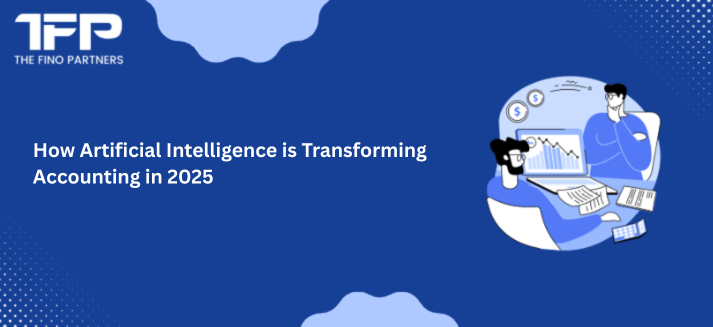Have you noticed how fast financial reports are created nowadays? Or how tax filing feels so much easier than it used to? That is because AI is doing the heavy work behind the scenes. In 2025, accounting is no longer just about creating excel sheets, receipt stacks or interminable hours of data entry.
AI in accounting makes hours-long tasks possible in minutes and that too with fewer errors. So, whether you are a small business owner, startup founder, or somebody handling personal finances, AI impacts you directly.
If you are looking for dependable accounting services in this brand-new tech-driven market, this blog will help you find one. We will also explain how AI is altering the rules of accounting and how you can benefit from this shift.
How is AI Changing the Accounting Sector in 2025?
The U.S. economy has been changing quickly post-2020 and many companies are implementing digital tools to remain competitive. With more complicated financial laws and rising expectations from clients, accounting companies are likely to provide quicker, more accurate and cheaper services.
That is where artificial intelligence in accounting 2025 will come in handy. Today AI systems are smart enough to:
- Automate bookkeeping.
- Classify expenses.
- Detect fraud.
- Forecast cash flow.
- Handle tax compliance.
- Assist with audits.
This transformation is cutting costs and also increasing accuracy, while leaving accountants to concentrate on strategy and client relationships.
What Is the Role of AI in Accounting Exactly?
AI in accounting and finance is basically a "smart software” that thinks and learns from data. These systems utilize technologies like:
- Machine learning in accounting: The software becomes better with more data processing.
- Natural language processing: AI responds to human queries.
- Robotic process automation (RPA): Repetitive tasks like invoice matching or payroll are performed automatically.
This isn't about replacing accountants. Instead, AI performs the boring, repetitive work, so accountants are able to focus on tasks like evaluating, advising and making informed decisions.
Benefits of Accounting Automation with AI
This is how accounting automation is helping companies and accounting professionals in 2025:
Time Savings
Things like entering receipts, matching transactions or even generating reports used to take hours. They are done in minutes with AI and automation.
Fewer Errors
AI systems are not inaccurate. They spot inconsistencies and flag possible issues with near perfect accuracy.
Real-Time Insights
AI software produces live dashboards of your financial health. This helps you make fast and informed business choices.
Cost Efficiency
Less manual work means businesses spend much less on labor and avoid costly errors which can result in penalties.
Scalability
Got thousands of transactions to process during tax season 2025? AI can scale up instantly without employing temporary staff.
Real-World AI Applications in Accounting & Finance
This is how AI is being utilized in daily accounting scenarios:
- Invoice Management
AI programs like QuickBooks or Xero pull info from invoices, match it with purchase orders and enter it into the program automatically. - Fraud Detection
AI tools spot unusual patterns in transactions. This can help catch frauds before they become a real issue. - Tax Compliance and Filing
Keeping up with U.S. tax regulations is tough. AI tracks updates, recommends deductions and files forms on time, decreasing your audit risk. - Cash Flow Forecasting
AI can examine previous data and predict future income and expenses via machine learning in accounting. This helps with proper financial planning. - Auditing
AI can scan thousands of transactions to leave an audit trail, discover discrepancies and even make preliminary audit reports.
Top AI Tools Changing Accounting in 2025
Many software platforms are paving the AI wave in the accounting space. Below are a few you might already be utilizing or should think about:
- QuickBooks Online: Predicts cash flow problems and categorizes expenses using AI.
- Xero: Provides intelligent suggestions based upon transaction history and automatically generates financial statements.
- Zoho Books: AI-enabled invoice creation & payment reminders.
- Botkeeper: Automates bookkeeping for CPAs/accounting companies.
- Vic.ai: Intelligent invoice processing and approval workflows.
These tools provide various levels of accounting automation with AI based on whether you're a freelancer or a big enterprise.
How AI Is Changing How Accountants Work
Many people fear that AI will take away jobs. But in reality, AI is changing the role of accountants and not replacing them.
What is being taken away by AI:
- Manual data entry.
- Paper-based invoicing.
- Time spent on reconciling accounts.
What AI is enabling accountants to focus on:
- Advisory roles.
- Data analysis.
- Strategy consulting.
- AI tool management.
Accountants who adapt to AI and automation will be more sought after in the accounting industry. This will help create informed financial advisors and tech-savvy strategists.
Industries That Benefit Most from AI in Accounting
AI is helping virtually all sectors but some of these are getting significant benefits:
- Startups
Do youneed to keep costs low but scale fast? AI tools offer inexpensive real-time financial insight without having a huge accounting team in-house. - E-commerce
With thousands of daily transactions, automated accounting systems process orders, compute taxes and do inventory management. - HealthCare
Compliance is essential in healthcare. AI keeps records correct and files insurance claims and payments on time. - Freelancers & Small Businesses
AI-powered accounting apps help solo entrepreneurs cope with finances without having an accountant on staff.
Accounting Automation with AI: Challenges to Know
Even AI adoption isn't without its obstacles. Among the challenges are:
- Data security: Cyber threats must safeguard sensitive financial data.
- Implementation cost: Advanced tools might require an upfront investment.
- Needs for training: Staff should learn to use AI tools and interpret AI.
- Regulatory concerns: AI-generated reports continue to need human review to meet legal standards.
Still, the long-term efficiency and accuracy gains justify the effort for the majority of companies.
How the U.S. is Leading AI in Accounting in 2025
Business stats indicate that over 60% of US accounting firms have started using some type of AI. The U.S. also leads in AI investment for financial services, investing billions into smarter automation devices.
Also, new regulations are being introduced to help businesses adopt AI responsibly, for more innovation and data safety.
In the future, using AI will become a necessity as competition and expectations increase. This is a required minimum for any company which offers accounting services.
Also Read | AI and Automation in Accounting: Smarter Solutions
Final Thoughts
From managing your own finances to running a firm, AI is making accounting in 2025 smarter, quicker, and much more precise.
No longer do you need to spend hours on paperwork or be worried about last-minute tax surprises. With the right tools & support, you can remain compliant, make much better financial choices and expand your business confidently.
But for this to happen conveniently, choosing the right accounting services (ones that make use of AI wisely) is essential.
Trust our experts for transforming your accounting needs using the latest AI softwares and tools.
Get in touch with The Fino Partners today.




























